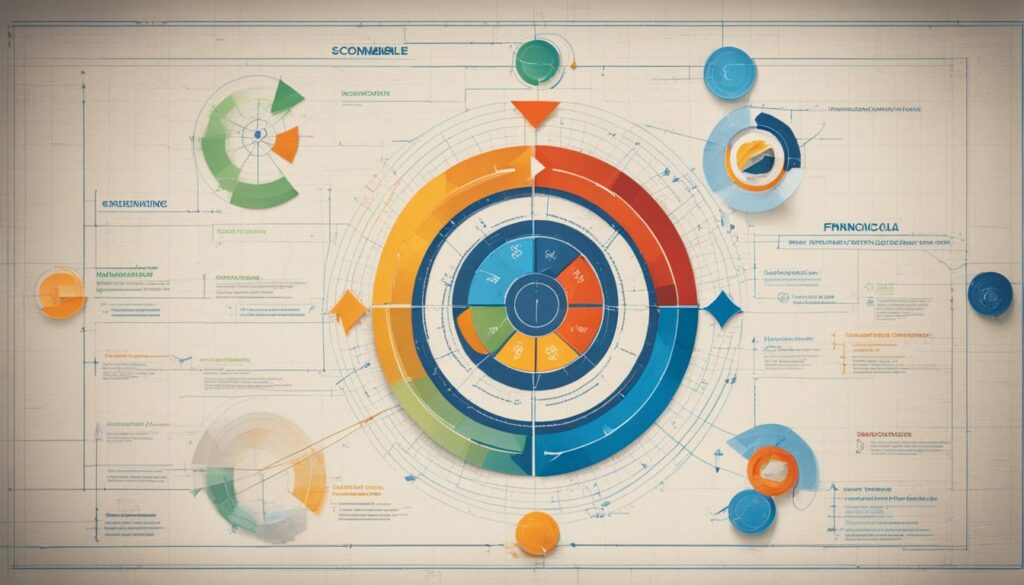In a world of constantly changing financial landscapes, mastering personal budgeting and money management is crucial for long-term financial stability. Developing a strong financial mindset and effectively managing your money can provide the foundation for a secure financial future.
Understanding the importance of personal budgeting and adopting effective money management strategies can empower individuals to take control of their finances and make informed financial decisions. By creating a budget, setting financial goals, and developing healthy money habits, individuals can work towards achieving financial success and securing their financial freedom.
Key Takeaways:
- Mental Money Management is essential for long-term financial stability.
- Developing a strong financial mindset is crucial in effectively managing your money.
- Creating a budget and setting financial goals are key components of personal budgeting.
- Effective money management strategies can help individuals take control of their finances.
- Continued financial education is important for making informed financial decisions.
The Importance of Personal Budgeting
Personal budgeting plays a crucial role in shaping your financial future. It goes beyond simply tracking income and expenses – it empowers you with financial awareness, goal setting, and control over your spending. By creating a budget, you gain a clear understanding of your financial situation, allowing you to make informed decisions and prioritize your financial goals.
Financial awareness is one of the key benefits of personal budgeting. It provides a comprehensive overview of your income sources and expenses, giving you a holistic view of your financial health. With this knowledge, you can identify areas where you may be overspending or areas where you can save. By tracking your income and expenses, you can also spot trends and patterns, enabling you to make adjustments and optimize your financial management.
Goal setting is another essential aspect of personal budgeting. By setting specific financial goals, such as saving for a down payment on a house or paying off debt, you can create a roadmap to achieve them. Your budget serves as a tool to allocate funds towards these goals, ensuring that you are actively working towards them. Whether it’s short-term goals like building an emergency fund or long-term goals like planning for retirement, a budget allows you to take control of your financial future.
Control Over Spending
One of the most significant advantages of personal budgeting is the control it gives you over your spending habits. With a budget, you assign specific amounts to different expense categories, such as housing, transportation, and entertainment. This allocation helps you make conscious decisions regarding your spending, as you are aware of how much you have available for each category.
By having control over your spending, you can avoid unnecessary expenses and focus on what truly matters to you. It helps you differentiate between needs and wants, enabling you to prioritize your financial resources accordingly. As a result, you are better equipped to save, invest, and make progress towards your financial goals.
Creating Your Budget
To effectively manage your finances and achieve your financial goals, it is essential to create a budget that serves as a roadmap for your financial journey. By following a step-by-step approach, you can create a budget that takes into account your income, expenses, and savings priorities. Here are some key steps to help you create your budget:
Calculate Your Income
The first step in creating a budget is to calculate your total monthly income. This includes your salary, wages, freelance earnings, rental income, and any other sources of income you may have. Be sure to consider your after-tax income to get an accurate picture of the money you have available to allocate towards expenses and savings.
List Your Expenses
Next, list all your expenses, both fixed and variable. Fixed expenses include rent or mortgage payments, insurance premiums, utility bills, and loan repayments. Variable expenses include groceries, dining out, entertainment, transportation, and other discretionary spending. It is important to be thorough and include all your expenses to ensure an accurate reflection of your financial situation.
Set Financial Goals
After calculating your income and listing your expenses, it’s time to set financial goals. Think about what you want to achieve financially, such as saving for a down payment on a house, paying off debt, or building an emergency fund. Setting clear and specific financial goals will help you prioritize your spending and saving decisions.
Prioritize Savings
When creating your budget, it is crucial to prioritize savings. Treat savings as a non-negotiable expense and allocate a portion of your income towards building an emergency fund and saving for long-term goals like retirement or education. By making savings a priority, you are ensuring financial security and creating a cushion for unforeseen expenses.
Once you have completed these steps, you will have a comprehensive budget that reflects your income, expenses, and savings goals. Remember to regularly review and adjust your budget as your financial situation changes, and celebrate your progress along the way.
| Income | Amount |
|---|---|
| Salary | $5,000 |
| Rental Income | $1,000 |
| Freelance Earnings | $500 |
| Total Income | $6,500 |
| Expenses | Amount |
|---|---|
| Rent/Mortgage | $1,500 |
| Utilities | $200 |
| Groceries | $400 |
| Dining Out | $200 |
| Transportation | $300 |
| Entertainment | $150 |
| Total Expenses | $2,750 |
Effective Money Management Strategies
To achieve financial stability and long-term success, it is essential to implement effective money management strategies. By employing prudent financial practices, you can build a solid foundation for your financial future while minimizing risks and maximizing opportunities. This section will explore key strategies, including emergency fund creation, debt management, savings and investments, retirement planning, insurance coverage, credit management, lifestyle choices, and continual education.
Emergency Fund: Protecting Your Financial Well-being
An emergency fund is a crucial component of effective money management. This fund provides a safety net in times of unexpected expenses or income loss. Aim to save three to six months’ worth of living expenses in a separate account that is easily accessible. By having an emergency fund, you can avoid resorting to high-interest credit card debt or loans, providing financial stability and peace of mind.
Debt Management: Tackling and Reducing Debt
Efficient debt management is key to maintaining healthy finances. Begin by assessing your current debt and creating a repayment plan. Prioritize debts with higher interest rates while making minimum payments on others. Consider strategies like the debt snowball method, where you focus on paying off the smallest debts first, to build momentum and motivation. Implementing a debt management plan will help you regain control over your financial health.
Savings and Investments: Building Wealth for the Future
Setting aside a portion of your income for savings and investments is vital for long-term financial success. Establish automatic contributions to a savings account each month and gradually increase the amount as your income allows. Additionally, consider diversifying your investments to minimize risk and maximize growth potential. Consult with a financial advisor to determine the best investment options based on your financial goals and risk tolerance.
| Investment Option | Pros | Cons |
|---|---|---|
| Stocks | Potential for high returns | Volatility and risk of loss |
| Bonds | Steady income and lower risk compared to stocks | Lower potential for growth |
| Real Estate | Potential for passive income and appreciation | Requires significant capital and time commitment |
| Mutual Funds | Diversification and professional management | Fees and expenses |
Retirement Planning: Securing Your Future
It is crucial to plan for retirement and ensure financial security during your golden years. Start early by contributing to retirement accounts like 401(k)s or individual retirement accounts (IRAs). Take advantage of employer matching contributions and explore options for additional retirement savings. Regularly review your retirement plan and adjust contributions as your financial situation evolves.
Insurance Coverage: Protecting Your Assets
Insurance coverage is an essential aspect of financial planning. Evaluate your insurance needs, including health, life, disability, and property insurance. Ensure that you have adequate coverage to protect your assets and loved ones in case of unexpected events. Regularly review your policies and make adjustments as necessary.
Credit Management: Maintaining a Healthy Credit Profile
Managing your credit effectively is vital for financial success. Keep track of your credit score and regularly review your credit reports for any inaccuracies. Pay bills on time, keep credit card balances low, and avoid unnecessary debt. By maintaining a healthy credit profile, you can access better interest rates and loan options in the future.
Lifestyle Choices: Aligning Spending with Values
Make conscious lifestyle choices that align with your financial goals. Analyze your spending habits and identify areas where you can cut back or make more cost-effective choices. Differentiate between essential and non-essential expenses and prioritize saving and investing over impulsive purchases. By aligning your spending with your values, you can live a fulfilling life while maintaining financial stability.
Continual Education: Enhancing Financial Knowledge
Financial education is an ongoing process that empowers you to make informed decisions. Stay up-to-date with the latest financial trends, attend workshops or webinars, and read books or articles from reputable sources. Continually expanding your financial knowledge will enable you to adapt to changing economic landscapes and make sound financial choices.
By implementing these effective money management strategies, you can cultivate a strong financial foundation, achieve your goals, and secure a bright future for yourself and your loved ones.

Maintaining and Reviewing Your Budget
Creating a budget is an essential step in achieving your financial goals, but it doesn’t end there. To ensure effective money management, it’s crucial to regularly maintain and review your budget. This allows you to track your progress, make necessary adjustments, and stay on top of your financial situation.
One helpful tool for maintaining your budget is budgeting apps. These apps provide a convenient way to track your income and expenses, categorize transactions, and generate reports. Some popular budgeting apps include Mint, YNAB (You Need a Budget), and Personal Capital. Choose the one that suits your needs and preferences, and make it a habit to update your budget regularly.
When reviewing your budget, assess your progress towards your financial goals. Are you saving as much as you planned? Are there any areas where you can cut back on expenses? Take the time to analyze your spending habits and identify areas for improvement. This process allows you to make informed decisions about your finances and make any necessary adjustments to stay on track.
Moreover, celebrate your milestones along the way. Whether it’s paying off a debt, reaching a savings goal, or sticking to your budget for a certain period of time, acknowledge your achievements. Celebrating small victories can help you stay motivated and encourage financial discipline in the long run.

Example Budget Review Table
| Category | Planned Amount | Actual Amount |
|---|---|---|
| Housing | $1,200 | $1,150 |
| Utilities | $200 | $180 |
| Transportation | $300 | $350 |
| Groceries | $400 | $380 |
| Entertainment | $100 | $120 |
In the example table above, you can see the planned amounts versus the actual amounts for various budget categories. This allows you to assess whether you are overspending or underspending in each area. Use this information to make adjustments and reallocate funds if necessary. Remember, budgeting is a dynamic process, and regular reviews are essential for staying on top of your financial goals.
Take Inventory of Your Finances
Before you can effectively manage your money, it’s essential to take a close look at your current financial situation. By taking inventory of your finances, you can identify areas of weakness and create a plan to improve your money management skills.
One common area of concern is overspending. Look at your monthly expenses and evaluate where you may be spending more than necessary. Are there any non-essential expenses that you can cut back on or eliminate altogether? Taking control of your spending habits is a crucial step towards achieving financial stability.
Another issue that many individuals face is living paycheck to paycheck. If you find yourself constantly struggling to make ends meet, it’s time to reassess your financial priorities. Look for ways to increase your income or reduce your expenses. Developing a budget and sticking to it can help you break free from the cycle of living paycheck to paycheck.
Lastly, consider your financial mindset. Are your thoughts and beliefs about money holding you back from achieving your financial goals? Adopting a positive and proactive mindset can make a significant difference in your approach to managing your money. Educate yourself about personal finance, seek advice from experts, and surround yourself with like-minded individuals who can support and motivate you on your financial journey.
By taking inventory of your finances, addressing issues like overspending and living paycheck to paycheck, and cultivating a positive financial mindset, you will be well on your way to mastering the art of money management.

Overspending: A Simple Solution
“Overspending is one of the most common financial challenges individuals face. Is it possible to overcome this habit and regain control over your finances? Absolutely. By following a simple solution, you can tackle overspending head-on.
- Track your expenses: Start by keeping a detailed record of every single expense. Whether it’s a cup of coffee or a new pair of shoes, write it down. This will help you become more aware of where your money is going.
- Create a budget: Use the information gathered from tracking your expenses to create a realistic budget. Set limits for different categories and prioritize your spending. Be sure to allocate funds towards savings and debt repayment.
- Practice delayed gratification: Before making a purchase, give yourself a cooling-off period. This will help you determine if it’s a true need or simply a want. By practicing delayed gratification, you can avoid impulsive purchases and save money in the long run.
- Find alternative sources of satisfaction: Overspending often stems from seeking comfort or fulfillment through material possessions. Instead, explore alternative sources of satisfaction such as spending time with loved ones, engaging in hobbies, or giving back to your community.
Remember, breaking the cycle of overspending takes time and effort. It’s about making conscious choices and prioritizing your long-term financial well-being. Stay committed and stay focused, and you’ll be well on your way to financial success.”
Build a Money Management Blueprint
Building a money management blueprint is essential for taking control of your finances and working towards your financial goals. By following a structured plan, you can effectively budget, track your spending, save money, and pay off debt. Here are the key steps to include in your money management blueprint:
- Create a Budget: Start by creating a detailed budget that outlines your income and expenses. This will help you track where your money is going and identify areas where you can cut back on spending.
- Track Your Spending: Use a tracking system, such as a budgeting app or spreadsheet, to monitor your expenses. This will allow you to see where your money is being spent and make adjustments as needed.
- Save Money: Set savings goals and allocate a portion of your income towards savings. Consider using designated accounts or automatic transfers to make saving money easier.
- Pay off Debt: Prioritize paying off any outstanding debts by allocating extra funds towards debt repayment. Consider using strategies like the debt snowball or debt avalanche method to tackle your debts effectively.
By following these steps and consistently implementing them into your financial routine, you can build a solid money management blueprint that will help you achieve financial success.

Tracking Spending Example
| Category | Monthly Budget | Actual Expenses |
|---|---|---|
| Housing | $1,000 | $950 |
| Transportation | $300 | $280 |
| Groceries | $400 | $450 |
| Dining Out | $200 | $220 |
| Entertainment | $100 | $80 |
The table above illustrates an example of tracking spending. By comparing your monthly budget with your actual expenses, you can identify areas where you are overspending or where you have room to save. This information can guide your financial decisions and help you adjust your spending habits to align with your financial goals.
Becoming Financially Literate
Financial literacy is a crucial skill for anyone seeking to achieve long-term financial success. Understanding financial statements, investing wisely, and assessing your risk tolerance are all essential components of financial literacy. By acquiring these skills, you can make informed decisions about your money and take control of your financial future.
Reading financial statements is a fundamental aspect of financial literacy. These statements provide valuable insights into a company’s financial health and performance. By analyzing balance sheets, income statements, and cash flow statements, you can gain a deeper understanding of the company’s profitability, liquidity, and overall financial stability. This knowledge can help you make informed investment decisions and identify potential risks and opportunities.
Investing is another critical aspect of financial literacy. By understanding different investment options, such as stocks, bonds, mutual funds, and real estate, you can build a diversified portfolio that aligns with your financial goals and risk tolerance. It’s important to educate yourself about investment strategies, evaluate market trends, and stay updated on economic indicators to make informed investment decisions.
Assessing your risk tolerance is an integral part of financial literacy. Risk tolerance refers to your willingness and ability to endure fluctuations in the value of your investments. By understanding your risk tolerance, you can choose investments that align with your comfort level and long-term financial goals. It’s essential to evaluate your financial circumstances, investment horizon, and personal preferences when determining your risk tolerance.
The Importance of Financial Literacy
“Financial illiteracy is not an excuse for a lifetime of financial struggle. It is an invitation to a journey of personal growth and empowerment.” – Rob Liano
Financial literacy is the foundation for making sound financial decisions and achieving financial independence. It equips individuals with the knowledge and skills necessary to navigate complex financial landscapes, identify opportunities for wealth creation, and protect their financial well-being.
Without financial literacy, individuals risk falling into financial traps, making poor investment choices, and falling prey to scams and fraudulent schemes. By investing time and effort into improving financial literacy, individuals can gain confidence in managing their money, reduce financial stress, and pave the way for a brighter financial future.
| Benefits of Financial Literacy | Consequences of Financial Illiteracy |
|---|---|
|
|
By prioritizing financial literacy and taking proactive steps to improve your understanding of personal finance, you can build a solid foundation for your financial future. Whether through reading books, attending workshops, or seeking guidance from financial professionals, investing in financial literacy is an investment in yourself and your financial well-being.
Set Goals
Setting clear and meaningful goals is essential for achieving financial freedom. By creating a massive action plan and setting SMART goals, you can pave the way towards financial success and take control of your financial future.
Financial Freedom: Financial freedom means having the ability to live the life you desire without worrying about money. It allows you to make choices based on your values and passions rather than financial constraints.
Massive Action Plan: A massive action plan is a strategic roadmap that outlines the specific actions you need to take to achieve your financial goals. It requires commitment, consistency, and a willingness to go above and beyond to reach your objectives.
SMART Goals: SMART stands for Specific, Measurable, Achievable, Relevant, and Time-bound. When setting your financial goals, ensure they are specific, measurable, attainable, relevant to your overall financial plan, and have a clear deadline. This will help you stay focused and motivated throughout your financial journey.
Creating a table to track your goals can be a helpful visual tool. Here is an example of how you can structure your goal-setting table:
| Financial Goal | Specific Actions | Deadline |
|---|---|---|
| Paying off Credit Card Debt | Create a budget, increase monthly payments, negotiate lower interest rates | Pay off within 12 months |
| Saving for a Down Payment on a House | Set up automatic savings, reduce discretionary spending, explore additional income streams | Save $50,000 within 3 years |
| Investing for Retirement | Research investment options, consult with a financial advisor, contribute regularly to retirement accounts | Retire with $1 million by age 60 |
Remember, goal-setting is just the first step. Regularly review and adjust your goals as needed, celebrate your progress, and stay motivated on your journey towards financial freedom and success.
Conclusion
Mastering personal budgeting and money management is a crucial step towards achieving financial success and gaining financial confidence. By creating a comprehensive budget, setting financial goals, and implementing effective money management strategies, you can take control of your finances and reduce financial stress.
Throughout this article, we have explored the importance of personal budgeting in creating a roadmap to financial success. By tracking your income and expenses, setting goals, and having control over spending, you can make informed financial decisions and work towards long-term financial stability.
Remember, it’s not just about creating a budget, but also about maintaining and reviewing it regularly. Make use of budgeting tools and apps to track your progress, make adjustments as needed, and celebrate your milestones along the way.
By taking inventory of your finances, building a money management blueprint, and becoming financially literate, you can develop the skills and knowledge needed to make informed financial choices. With dedication, discipline, and a commitment to your financial well-being, you can master your money and achieve financial success.
FAQ
What is personal budgeting?
Personal budgeting is the process of tracking income and expenses, setting financial goals, and having control over spending to achieve long-term financial stability.
Why is personal budgeting important?
Personal budgeting is important because it provides financial awareness, reduces financial stress, and enables informed financial decisions.
How do I create a budget?
To create a budget, calculate your total monthly income, list your expenses, set financial goals, prioritize savings, and allocate funds towards debt repayment.
What are effective money management strategies?
Effective money management strategies include building an emergency fund, prioritizing debt management, diversifying investments, planning for retirement, ensuring proper insurance coverage, managing credit, making lifestyle choices, and continuing to educate oneself on personal finance trends.
How often should I review my budget?
It is recommended to regularly review and adjust your budget to reflect changes in your financial situation and goals. Set aside time each month to assess progress, make adjustments, and celebrate milestones.
How can I improve my money management skills?
Take a mental inventory of your finances to identify areas of weakness, assess your financial mindset, and make the necessary adjustments. Building a money management blueprint, tracking expenses, saving money, and developing a plan to pay off debt can also help improve money management skills.
How can I become financially literate?
Become financially literate by learning to read financial statements, understanding common vocabulary, and gaining knowledge about investing. Consider your risk tolerance and goals when making investment decisions.
How do I set financial goals?
Set financial goals by creating a massive action plan, connecting your goals to your purpose, and setting smaller, measurable SMART goals that align with your bigger goal. Track and celebrate your progress as you work towards financial success.
How Can Mastering Delayed Gratification Lead to Better Mental Money Management?
Mastering delayed gratification for financial gain can significantly impact one’s mental money management. The ability to resist immediate desires and focus on long-term goals allows for better financial planning and decision-making. By delaying instant gratification, individuals can prioritize saving, investing, and making informed financial choices, ultimately leading to a more secure and prosperous financial future.

